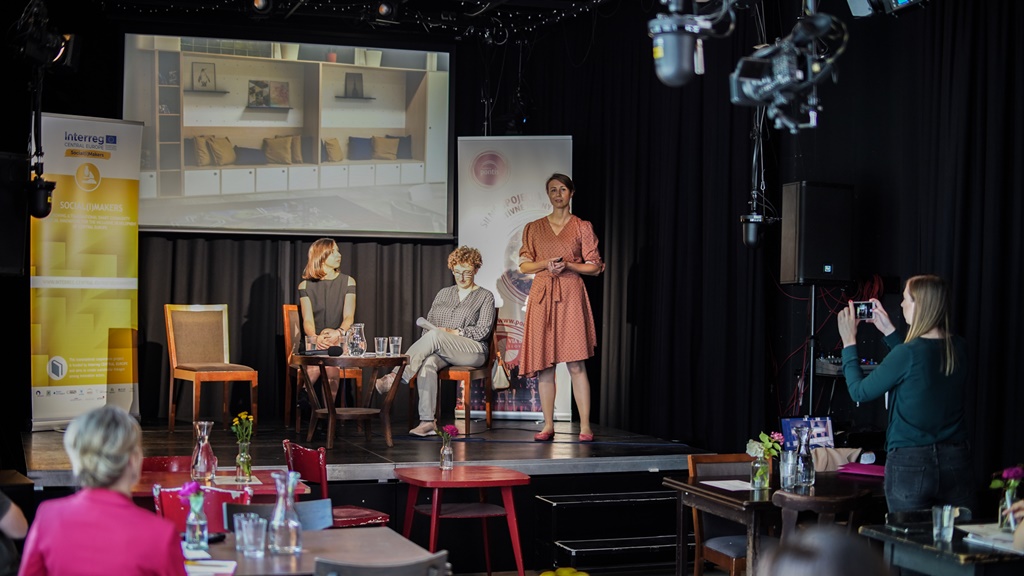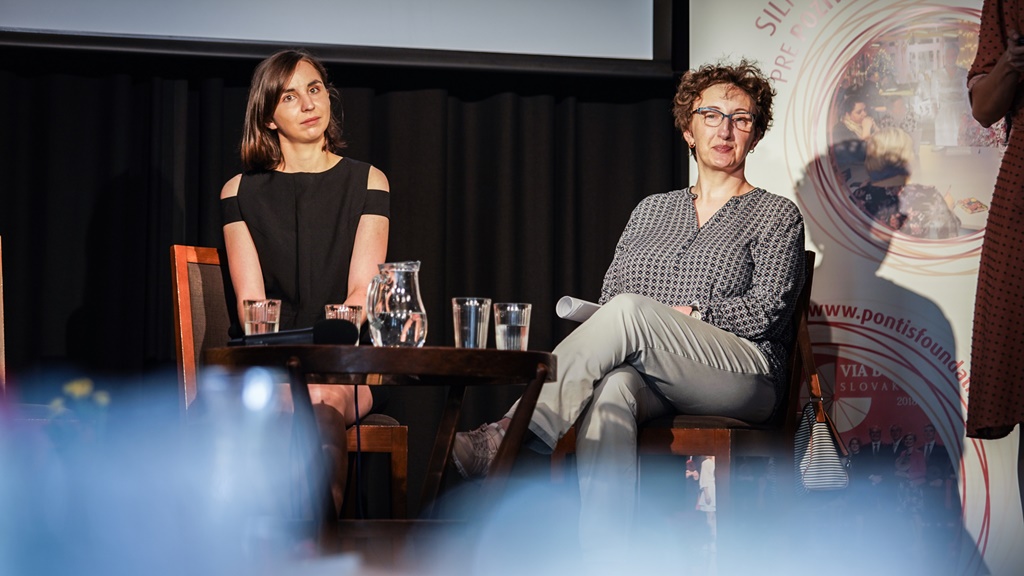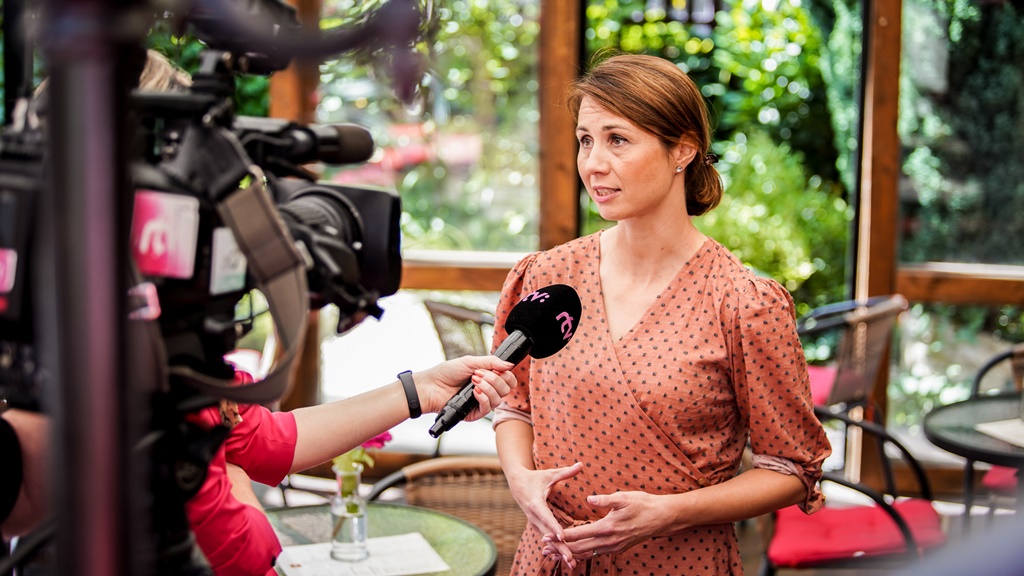Social innovation improves society. With the right investment, innovations can bring three times the value
In Slovakia, there already are projects which innovatively improve the lives of various, not only disadvantaged, groups of the population and also have a positive impact on the economy. This was the main message of the media breakfast which we held on the 23rd of June to introduce journalists to what social innovation is and why we need it. The intention was also to present the results of the FOCUS survey on the awareness of the concept of social innovation, as well as to draw attention to the example of social innovation by the Pontis Foundation – the Open Future programme. Sylvia Šumšalová, Project Manager of the FOCUS agency, Martina Kolesárová, Executive Director of the Pontis Foundation, and Daniela Kellerová, Project Manager of the Open Future programme spoke at the event.
As many as four-fifths of respondents (81%) are not aware of any social innovation, in Slovakia or abroad. This follows from the FOCUS survey conducted for the Pontis Foundation in May on a sample of 1,011 respondents.
On the contrary, a fifth of respondents mentioned various fields which they consider to be social innovations. Two percent gave examples from the fields of dealing with Roma community issues, social assistance, solutions for unemployment, social enterprises, and solutions for senior citizens.
The most is expected of the state
People in Slovakia agree that social innovations should be made mainly by the state and local self-governments (towns and municipalities). On a scale from 0 (certainly not to do social innovation) to 10 (certainly to do social innovation), the state was awarded an average mark of up to 8.1, and towns and municipalities an average mark of 7.6. Expectations are high also for large enterprises (7.1), as well as for universities and scientific institutions (6.6), civic organisations (6.5) and small and medium-sized enterprises (6.5).
Respondents consider healthcare system (63%), economy (43%), education (34%), social disparities (29%) and the environment (25%) to be the most important fields in need of innovation.
Up to 95% of respondents do not know any social enterprises in Slovakia or abroad, or they are not able to comment on their existence.

The right investment can bring three times the value
The Pontis Foundation focuses on the issue of social innovations in Slovakia. Already in 2015, in cooperation with the Ashoka organisation, the foundation created a map of social innovators, i.e. people who bring positive change.
“Social innovation, which often emerges from the civic sector, can help respond to shortcomings in society. It is important to realise that innovation is not just about new technologies. We can find such examples in the field of education, the fight against poverty, among various forms of disadvantages, or the field of the fight against corruption,” explains Martina Kolesárová, Executive Director of the Pontis Foundation.
Social innovation is not just about “non-profit” and selflessness. With the right support, innovations can change the current system, increase the quality of life, use the potential of all members of society, and at the same time, they can bring economic value. “In Slovakia, we have social innovations which have undergone in-depth analyses. It has been proven that if we moved them to the system level, investment, for example by the state, would bring back two or even three times more value,” says M. Kolesárová.
The role of the state is not to come up with innovations, but to create an environment for them.
Kolesárová names the features that good social innovation should have:
- addresses society’s problems,
- brings unique solutions,
- measures its impact,
- has the ambition to change the system,
- connects players from different spheres,
- is sustainable in the long run.
“The Pontis Foundation has long supported cross-sectoral cooperation and social innovation. But for quality innovations to arise, as the state is not a typical innovator, it is necessary to introduce appropriate mechanisms and begin to perceive this field as important,” says M. Kolesárová. Hence, the role of the state is not to come up with innovations, but to create mechanisms to search for them and introduce them into the system.
Kolesárová considers as the main barriers to innovation the following: – the lack of appropriate financial mechanisms, shortcomings in impact measurement, bureaucratisation, for example in structural funding, insufficient cooperation, i.e. state mechanisms for searching for innovations, and the lack of support for all phases of the innovation cycle – testing, dissemination, impact verification, and the transfer to the system level.

The Open Future programme connects the principles of social innovation
The Pontis Foundation develops the Open Future programme in a way which combines the principles and tools of social innovation. It is a 3-year extracurricular programme for young people aged 11 to 15.
In Slovakia, we have one of the highest links between social disadvantage and poor student performance within the EU and the OECD. According to the Revision of Expenditure on Groups at Risk of Poverty or Social Exclusion (UHP, 2020), less than 1% of children from poor Roma families go to grammar schools, and less than 7% attend university. * Up to 41% of children do not use technologies in a meaningful way. * *
Based on research and cooperation with experts, the Open Future centre was established as an innovative non-formal education in clubs at primary schools. The pilot centre in Trnava brings a different approach to spending free time, and it is open to every child without distinction, which emphasises its inclusive dimension.
“Participants will gain access to so-called mini coworking space, a safe and secure environment with refreshments, which is also supported by long-term mentoring by our employees. For three years now, the children have been working on an idea solving a problem from their communities and surroundings, through which they will acquire the necessary skills,” explains Daniela Kellerová, Project Manager of the Open Future programme.
Twice a week, children meet inspiring guests, try microbit coding and go on interesting excursions. In addition to digital skills, they also learn much about teamwork.
The Open Future programme connects the social entrepreneurship, soft skills and digital skills professionals who create the content. Further, it involves experts from companies as lecturers, university students as mentors and also engages towns with a higher proportion of disadvantaged students who want to develop the skills of young people.
The centre will provide a 3-year programme for up to 75 children in three years. In the first year, 21 participants have joined. The vision is to disseminate such centres to other regions and towns all across Slovakia.
* Value for Money Department, 2020 (p. 78-79) https://www.employment.gov.sk/files/slovensky/ministerstvo/analyticke-centrum/analyticke-komentare/reviziavydavkovnaohrozeneskupinyzsverziafinal3.pdf (Available in Slovak)
** A survey by the FOCUS agency for the Telekom Endowment Fund at the Pontis Foundation conducted in June 2019. The survey compared the digital literacy of children, also those from socially disadvantaged backgrounds, on a sample of almost 1,000 respondents.






